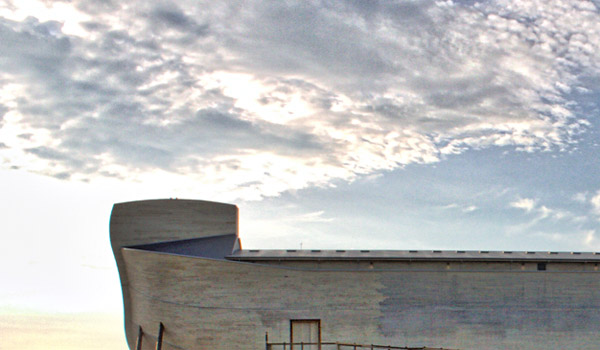
Make yourself an ark of gopher wood. Make rooms in the ark, and cover it inside and out with pitch. This is how you are to make it: the length of the ark 300 cubits, its breadth 50 cubits, and its height 30 cubits (Genesis 6:14-15).
The Big Boat
The dimensions of the ark were about 450 feet long, by 75 feet wide, by 45 feet high. Such a huge vessel would have had a total storage capacity of almost one and a half million square feet. Others, who are scientists and mathematicians, have done extensive calculations to show how the ark — contrary to some objections — would be able to house all the animals necessary to accomplish God’s purpose of saving each breathing species of creature.
God saved Noah, his family, and all the breathing animals. Just like God said he would.
I am very thankful for these faithful, careful minds that help us to “think God’s thoughts after Him.” However, the main takeaway from this passage in Genesis is not God’s explanation to humans of how God got all the animals on the Ark — rather, it is that God is able, whether humans understand God or not, to save anything or anyone God wants to. The fact is, we today don’t know exactly how God had Noah build the Ark, exactly what or how many animals were placed on the Ark, etc. Any more than we know exactly how the Egyptians built the Pyramids.
What we know plainly from Scripture is that God saved Noah, his family, and all the breathing animals. Just like God said he would.
The Big God
Most objections to the story of Noah’s ark — or to Jonah’s being swallowed by a fish, or to Jesus raising someone from the dead — come from the standpoint of naturalistic assumptions. In other words, it is assumed first that there is no God, really, and then Christians are questioned on how any of these things could happen naturally.
But the point of the Bible is that these things could not ever happen naturally, without divine intervention! Noah couldn’t have known a flood was coming, or how to build an Ark, or how big to make it, or how to save all the animals without the Lord instructing him each step of the way. Jonah could not have survived three days in the belly of a fish unless God sent the fish for that purpose. And Jesus could not raise people from the dead… unless he was the Son of God, as he claimed to be.
If you first posit a God who creates the universe with nothing but his words, a God who can destroy every breathing being with a worldwide flood, then it is easy to believe that such a God can plan and execute the salvation of some people and animals from this judgment. If you first admit there is a God who can send a storm to chasten his prophet Jonah, then it is easy to believe God can also provide for Jonah in a fish’s belly. If you first recognize that Jesus was conceived by the Holy Spirit and was sent from God as the Savior of the world, then there is no question that such a God-man could raise people from the dead. And that is the point.
The Big Point
The Bible is not so interested in proving how God does things, as it is in declaring that there is a God.
Our job is to proclaim the God who is proclaimed in God’s Word.
Our responsibility as Christians, likewise, is not primarily to explain all the ins and outs of how God does what he does — although God’s world does reflect his character and glory. Our job is to proclaim the God who is proclaimed in God’s Word. And our role as humans is to submit to our Creator and to trust the Word he has given us.
This God made the world. This God will come in judgment. And only this God is able to save people from his own righteous judgment. This is the main lesson of this true story of Noah’s Ark.